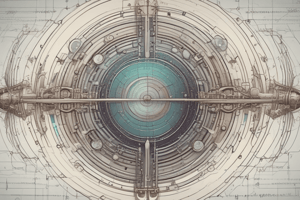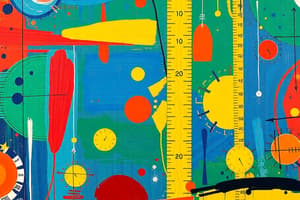Podcast
Questions and Answers
Why is measurement crucial for understanding natural phenomena in Physics?
Why is measurement crucial for understanding natural phenomena in Physics?
- It establishes a standard for comparing different scientific disciplines.
- It helps in quantifying various aspects like velocity, time, and mass, providing a complete description. (correct)
- It simplifies complex theories by reducing them to numerical values.
- It allows us to express observations using a universal system of units, ensuring global collaboration.
What is the relationship between the numerical value of a physical quantity and the size of its unit?
What is the relationship between the numerical value of a physical quantity and the size of its unit?
- They are independent of each other; changing the unit size has no effect on the numerical value.
- They are inversely proportional; increasing the unit size decreases the numerical value. (correct)
- They are directly proportional; increasing the unit size increases the numerical value.
- They are exponentially related; a small change in unit size leads to a large change in the numerical value.
If the length of a table is measured as 6 meters, what does this measurement represent?
If the length of a table is measured as 6 meters, what does this measurement represent?
- The table's length is equivalent to six standard units of mass.
- The unit of length (meter) is contained six times in the length of the table. (correct)
- The table is six times longer than the standard kilogram.
- The table contains six units of time.
A force is measured using two different systems of units. In the first system, it is found to be $n_1u_1$, and in the second system, it is $n_2u_2$. Which statement is correct regarding the force's magnitude?
A force is measured using two different systems of units. In the first system, it is found to be $n_1u_1$, and in the second system, it is $n_2u_2$. Which statement is correct regarding the force's magnitude?
How does measuring distance and time contribute to determining the speed of an object?
How does measuring distance and time contribute to determining the speed of an object?
What distinguishes a physical quantity from other types of quantities?
What distinguishes a physical quantity from other types of quantities?
Why is the Systeme International (SI) system preferred in scientific and engineering fields?
Why is the Systeme International (SI) system preferred in scientific and engineering fields?
In the equation $Q = nu$, what do $Q$, $n$, and $u$ represent, respectively?
In the equation $Q = nu$, what do $Q$, $n$, and $u$ represent, respectively?
Why is physics known as 'the science of measurement'?
Why is physics known as 'the science of measurement'?
To find the pressure exerted on a surface, which measurements are essential?
To find the pressure exerted on a surface, which measurements are essential?
Flashcards
Physical Quantities
Physical Quantities
Quantities measurable in physics, like length and mass.
Units of Measurement
Units of Measurement
Standard quantities used to express physical quantities, e.g., meter, kilogram.
Systeme International (SI)
Systeme International (SI)
The universal system of units agreed upon by scientists and engineers.
Magnitude of Physical Quantity
Magnitude of Physical Quantity
Signup and view all the flashcards
Speed Equation
Speed Equation
Signup and view all the flashcards
Acceleration Equation
Acceleration Equation
Signup and view all the flashcards
Pressure Equation
Pressure Equation
Signup and view all the flashcards
Standard Quantity
Standard Quantity
Signup and view all the flashcards
Comparison in Measurement
Comparison in Measurement
Signup and view all the flashcards
Different Systems of Units
Different Systems of Units
Signup and view all the flashcards
Study Notes
Introduction to Units and Measurement
- Physics involves many physical quantities like length, mass, time, velocity, force, and pressure.
- Clear understanding of these quantities requires measurement.
- Measurement is comparing an unknown quantity to a known standard.
Unit of a Physical Quantity
- A physical quantity is something that can be measured directly or indirectly, and it is expressed in terms of units.
- The standard quantity used for comparison is called the unit.
- Measurement basically compares an unknown physical quantity with a known standard unit.
- Magnitude of a physical quantity = Numerical value × Size of unit.
- For instance, if a rod's length is 3 meters (Q=3m), the numerical value (n) is 3 and the unit (u) is 1 meter.
Need for Measurement
- Physics studies natural phenomena.
- Accurate description requires measuring various quantities involved.
- For example, a falling object needs to be described by its velocity, time, and the dependence of these on factors like height and mass.
- Measurement is essential for understanding distance, mass, and time.
- Measuring speed = distance/time
- Measuring acceleration = force/mass
- Measuring pressure = force/area
System of Units
- Scientists and engineers use the SI (System International) unit system.
- This system uses universally accepted units.
Studying That Suits You
Use AI to generate personalized quizzes and flashcards to suit your learning preferences.




